Book Review: 'Kiss Daddy Goodnight' by Louise Armstrong.
Kiss Daddy Goodnight is a special book. It is one of the earliest to explore childhood sexual abuse. Although many other books on the subject followed it, Louise Armstrong's was a radical work back in 1978 –– a time when society's bleak tradition of raping its children was even more forbidden to discuss than it is now. The book consists of many interviews with women who are survivors of incest.
Almost 40 years later, Armstrong's book is as relevant as ever: It is estimated that, today, more than 1 in 3 women and 1 in 6 men, experience sexual abuse before they reach adulthood. The majority of abusers are family members.
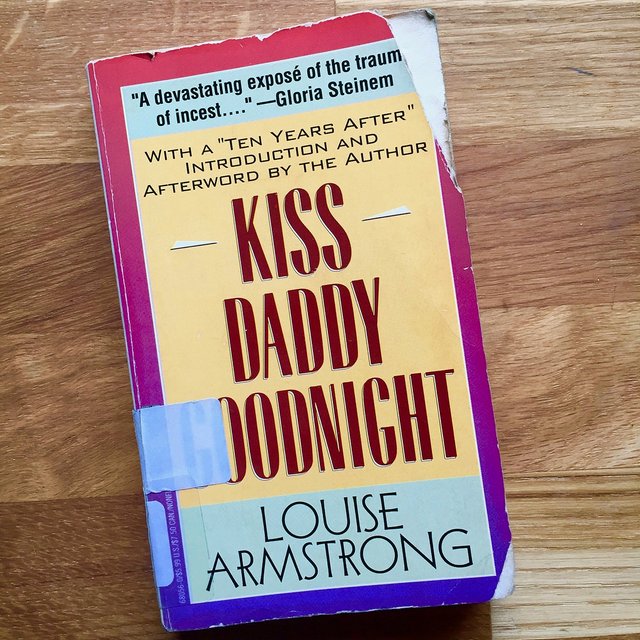
Kiss Daddy Goodnight contains many accounts of abuse that helped me, as a survivor of childhood sexual abuse myself, place my abuse within the context of the ongoing social-acceptability of child rape. What shocked me the most is that this information was available in 1978, but it was ignored. In the wake of Kiss Daddy Goodnight, we saw a world unfold where famous politicians raped children, retaining their positions, and state broadcasters (like the BBC) were free to facilitate paedophile rings, led by 'stars' like Jimmy Savile and Rolf Harris, involving thousands of children.
Millions of daughters and sons have been sexually abused by their families in the intervening years of inaction. As one of the interviewees in Armstrong's book puts it, "Incest isn't the taboo. Talking about it is".
I'd like to take a look at just one chapter in the book, as an example of the content. This chapter, 'Shampoos, Yet' opens by drawing the connection between how badly we allow men to treat women in a patriarchal society, and how this permission extends, then, to children:
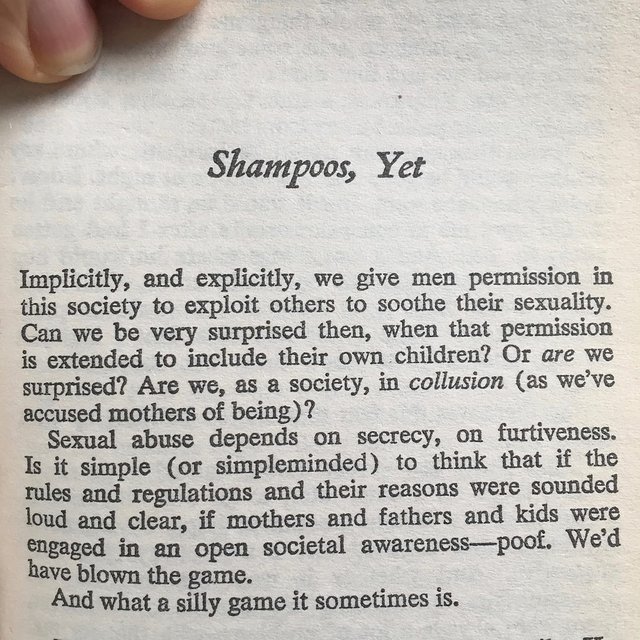
This was precisely my experience of being molested by my father and other men as a child. They had been placed, by society, in the roles of powerful male authority figures. In my father's case, simultaneously, he felt deeply weak and wounded on account of his own abuse as a child. This resulted in the perfect storm of repressed-memories of his own trauma combining with his power as a patriarch to simply re-enact the circumstances of his own childhood.
We live in a society that still does not easily allow men to talk about sexual abuse, or to express the emotions that would reconcile them with their pain, and thus themselves. And so, because the organism demands some outlet for the trauma, it is simply 'acted out'. It is this 'acting out' that society tacitly endorses. In short: Our culture would rather ignore a man abusing his child, than see him cry.
The survivor in this chapter goes on to describe how her father would demand 'shampoos' which would quickly degenerate into sexual abuse. This is something I remember from my own abuse experience. Baths, for example, lent a plausible deniability to what was actually taking place. Several people who abused me did so under the guise of giving me 'a bath', 'a shower', or 'helping' me get dressed:
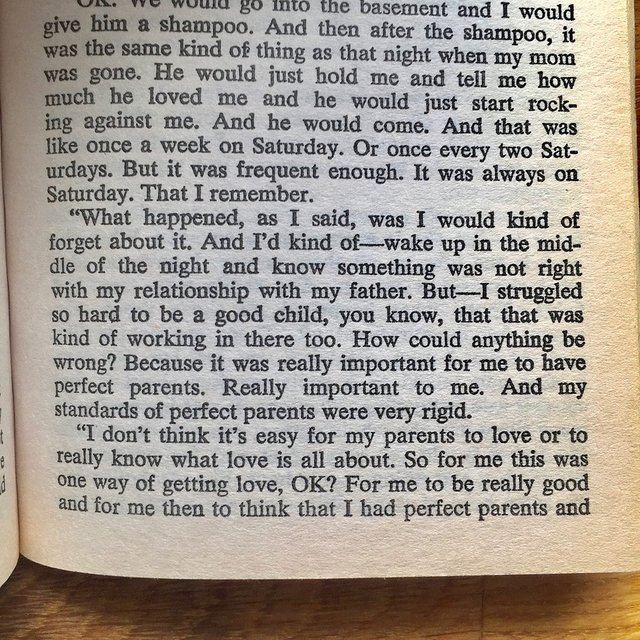
In the extract above, the survivor refers to the process of 'forgetting' or normalising the abuse in order to retain belief in the authenticity of her parent's love. This was the same for me as a kid.
It was necessary that I constantly reframe my experiences, and go through all kinds of mental contortions to explain to myself that I really was loved, and that the abuse was either not happening, or happening to some other kid who looked like me. On reflection, I can see how other kids might fracture under the pressure of such elaborate reframing and splitting-off of experience. Indeed, one of my childhood friends did fracture under the weight of abuse. He was later diagnosed with what society calls schizophrenia, but is most commonly, a habituated coping mechanism of splitting-off experience that the brain adopts when faced with unbearable contradictions in reality.
One of the most difficult, and common, contradictions is the one that occurs when a child must believe they are loved and cared for, while simultaneously experiencing horrific abuse.
My friend killed himself, damaging his eyes so badly that he died. This haunted me for months afterwards; but the metaphor was clear enough: he could not understand what he was seeing; he could not reconcile his abuse with what he was told to believe: That it hadn't happened. And so, he destroyed his vision of a world that seemed so full of internal contradiction that it was unwatchable.
As the psychologist RD Laing observed, "The experience and behavior that gets labeled schizophrenic is a special strategy that a person invents in order to live in an unliveable situation. "
To return to the book: The survivor in this chapter of Kiss Daddy Goodnight goes on to describe how her entire family was complicit in her abuse because, as a child, she was used as a mechanism to soothe her father's anger:
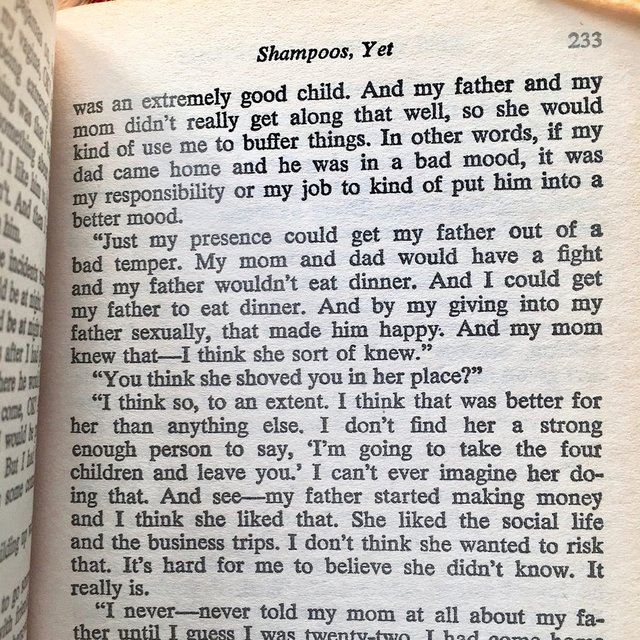
This is something else I could relate to. I was also used as both a soothing mechanism and a scapegoat in the family system as a kid. The family relied on my submission, and silence, when being molested. Painfully, the reason why many families can continue to exist is precisely because a child, or children, are nominated as psycho-emotional containers for the parent's disowned feelings.
For example, rather than a father feeling and processing his anger related to his own abuse, in a dysfunctional family, he will abuse a child. The child will then suffer the emotional affect that the father was unable to contain. In short, the patriarch outsources his unresolved pain to a nominated child, or children, who then 'feel' it for him.
Like many survivors, I had familiar methods used to silence and manipulate me: A dysfunctional family, inherently, is blind to the system in which they operate. If they were aware, the abuse would not occur.
As the media theorist Marshall McLuhan observed, “One thing about which fish know exactly nothing is water, since they have no anti-environment which would enable them to perceive the element they live in.”
In other words, families often get so deeply lost in their fantasy of reality, that it becomes impossible to see where the lie that covers the truth begins and ends.
Families which permit or permitted abuse will often go to any length to preserve the illusion of the patriarch's infallibility. This can persist for decades after the event –– often until they die. Accepting the reality of what actually happened would be too painful, even if the truth were visible to them for appraisal (McLuhan posits that it may not be).
There are many standard techniques a dysfunctional family uses for maintaining the fantasy of non-abuse when a survivor reaches adulthood and confronts the abuser(s). These techniques typically include unconsciously projecting anger that should be directed at the abuser onto the survivor. Another common technique is to claim the survivor is unreliable or mentally ill. This is known in psychology as projection, or 'gaslighting'. It deflects from the fact that the family is 'ill'.1
As the psychologist RD Laing often observed: Individuals express the dysfunction of a system. In other words: most often, when we call an individual 'mentally ill', we are merely engaged in a societal scapegoating. The individual is labelled ill, so that the dysfunctional society can continue to ignore its dysfunction. In fact, there is significant evidence to suggest that the majority of what we call 'mental illness' can be directly attributed to childhood coping mechanisms in the face of abuse. In short, many survivors, when confronting their abusers, are criticised for the very symptoms that their abuser has caused in them through their abuse.
The situation is not new. In his famous "Aetiology of Hysteria" (1896), Freud observed that all of his female 'patients' had been sexually abused –– often by their fathers. Viennese society, of course, immediately demanded that Freud retract the paper.2
The survivor in Kiss Daddy Goodnight describes how a family system, and society, will seek to conceal and endorse the behaviour of an abusive father. Here, the father is later ordained as a deacon in the Catholic Church. This is something else I could relate to, as both my abusive parents found positions in the church and 'business' which appeared, outwardly, to reflect care and responsibility. While, in reality, concealing the abuse. This passage is particularly interesting because the survivor notes how the 'church' and society is relatively shocked at adultery, or the dissolution of a marriage, but, as she puts it, to "turn to a seven year old" for sexual satisfaction is tacitly endorsed:
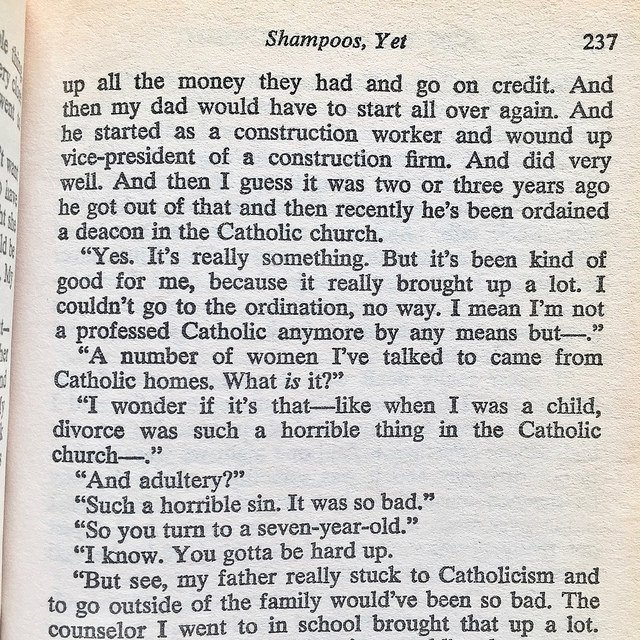
Indeed, when she goes to a priest for help, she discovers just how indifferent the church is to the wholesale abuse of children by adults. This is hardly surprising, given the propensity of organised religion to abuse children, but it reminded me vividly of the ways in which adults rationalised and dismissed my distress when I was being abused by multiple perpetrators in the UK. One of whom was a priest.
When the survivor tells the priest how her father is abusing her, she is told that "your father really loves you... his love just kind of went down the wrong path a little bit."
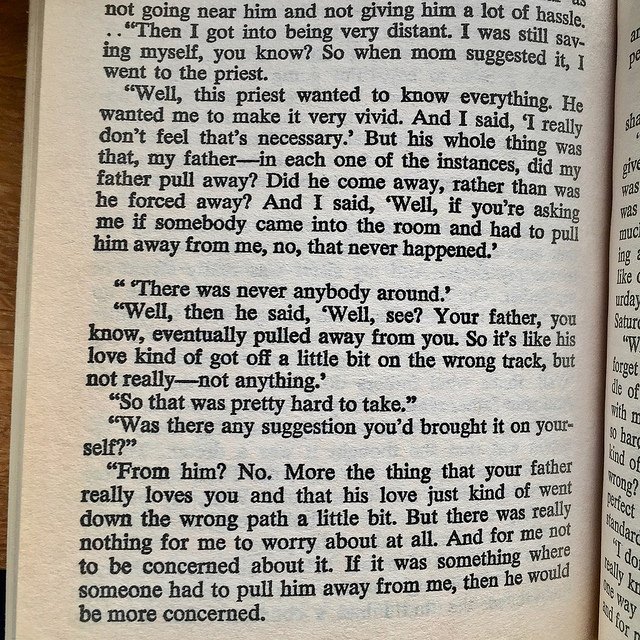
The survivor reflects on how the childhood abuse hasn't shaken her desire to "be the good daughter".
This section of the book affected me deeply, because I also felt I had to maintain a facade of being 'good' in the face of the abuse. This persisted into adulthood, until I was finally able to escape the 'water' (in the McLuhan sense) of the family; turn around and finally see it for what it actually was.
Like so many survivors, her need for 'love' from her family overrides the instinct to be free of them. This was, for me, also very difficult to overcome. But I eventually discovered such strong love for myself, that my need for external validation from a family that had abused me, evaporated in light.
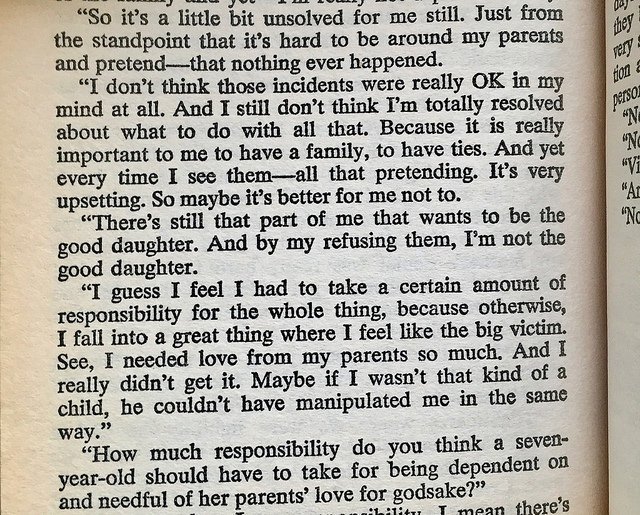
She asks, "How much responsibility do you think a seven year old should have to take for being dependent on and needful of her parent's love"?
The answer of course is: No responsibility at all. The children in Kiss Daddy Goodnight should never have been hurt. And the more we talk about this topic, the less children will have to experience this kind of abuse 'acted out' on them.
Thank you for reading this book review. This is a photo of me when I was a kid, at a time when I was being abused. This kid helped me get to a place where I can speak freely:
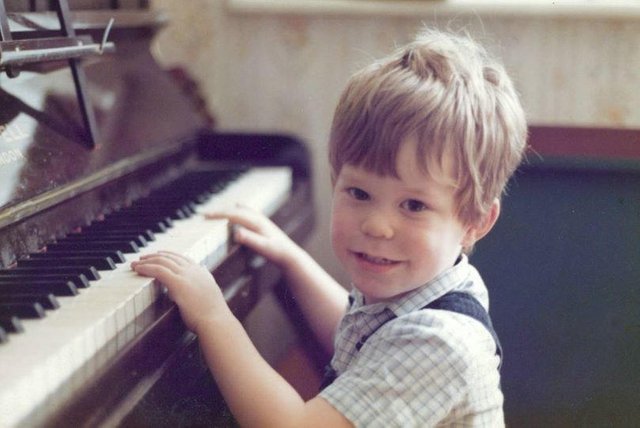
Footnotes
1 Gaslighting is often used on abuse victims. Both by the abuser, and by other family members who cannot face the reality of the abuse: https://en.wikipedia.org/wiki/Gaslighting
2 Jeffrey Masson wrote an excellent book on how Freud's findings on childhood abuse were surpressed: http://jeffreymasson.com/books/the-assault-on-truth.html
Hello @matrjoschka,
Congratulations! Your post has been chosen by the communities of SteemTrail as one of our top picks today.
Also, as a selection for being a top pick today, you have been awarded a TRAIL token for your participation on our innovative platform...STEEM.
Please visit SteemTrail to get instructions on how to claim your TRAIL token today.
If you wish to learn more about receiving additional TRAIL tokens and SteemTrail, stop by and chat with us.
Happy TRAIL!

And feminists harp on and on about stranger-danger rape.
Saying things like, "We live in a rape culture".
But, actual rape by a stranger is the least of the least likely.
The scary man who grabs a girl and drags her into the alley way is the boogyman of boogymen. Girls are taught to fear this. Be totally afraid.
Via national crime statistics stranger rape is 23 in 10,000 women.
Or not even 1%.
But, this is the lowest of the low. Women are FAR more likely to be raped by someone they know. Women really need to be told this. And learn to not be alone and drunk if they are not looking for sex with those people.
And, in America, boys and men are raped more than women.
It is not really that society puts these rapists into positions of power, it is that the people who are broken in the way that they see children or young adults as objects to have sex with seek power.
Govern-cement is full of full-blown Narcissists. It is because these creatures seek power at any cost. They will do whatever they can to get that power. (The govern-cement system we have has been designed by the powerful to be abused by the powerful. The pyramid scheme, of business, church and govern-cement, was designed by narcissist for narcissists) We can never vote them out. The system is 99% filled with their ilk.
So, it is programmed into us to defer to powerful people. And thus, it adds to their ability to abuse.
If we honestly were able to sample who are the rapists/paedophiles, we would assume that people in power were committing haenous sins, instead of thinking they were good by default.